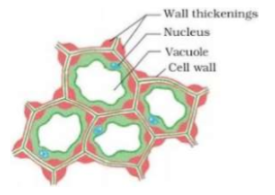In temperate region plants, the wood with fewer xylary elements and narrow vessels, is termed as:-
1. Spring wood
2. Autumn wood
3. Sap wood
4. Heart wood
1. Spring wood
2. Autumn wood
3. Sap wood
4. Heart wood
The term 'bark' includes:
I. Phellogen
II. Phellem
III. Phelloderm
IV. Secondary phloem
1. I, II and III only
2. I, II and IV only
3. II, III and IV only
4. I, II, III and IV only
Identify the incorrect statement:
1. The presence of vessels is a characteristic of angiosperms
2. In roots the primary xylem is exarch
3. Gymnosperms lack albuminous cells and sieve cells
4. Bast fibers are generally absent in primary phloem
Parts of grasses removed by the grazing herbivores are regenerated due to the activity of:
1. Apical meristem
2. Intercalary meristem
3. Interfascicular cambium
4. Fascicular vascular cambium
In the dicot root, the vascular cambium:-
1. is absent
2. is completely secondary in origin
3. does not form a continuous ring
4. originates from the tissue just above the phloem bundles
The pericycle, which gives rise to lateral roots, consists of:
1. Epithelial cells
2. Meristematic cells
3. Parenchymal cells
4. Endodermal cells
Summer wood is:
(1) the same as heartwood.
(2) found to the outside of each annular ring of xylem.
(3) found to the inside of each annular ring of xylem.
(4) formed throughout the growing season.
The given transverse section is of:
1. Monocot stem
2. Dicot stem
3. Monocot root
4. Dicot root
The vascular bundle shown in the diagram is most likely to be seen in:
1. Monocot stem
2. Dicot stem
3. Monocot root
4. Dicot root
The main function of the plant tissue shown below is:

1. Storage of nutrients
2. Providing buoyancy to submerged plants
3. Mechanical support to growing parts of a plant
4. Increase in the length of the plant



